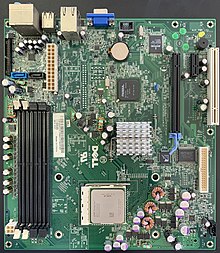
Back Rekenaaringenieurswese Afrikaans ኮምፒዩተር ምህንድሥና Amharic Incheniería informatica AN هندسة الحاسوب Arabic Inxeniería informática AST Kompüter mühəndisliyi Azerbaijani بیلگی سایار مۆهندیسلیگی AZB Компютърно инженерство Bulgarian কম্পিউটার প্রকৌশল Bengali/Bangla Računarsko inženjerstvo BS
| Occupation | |
|---|---|
| Names | Computer engineer |
Occupation type | Engineering |
Activity sectors | Telecommunications, technology industry, engineering industry |
| Specialty | Hardware engineering, software engineering, software programming, robotics, networking |
| Description | |
| Competencies | Technical knowledge, hardware design, software design |
Fields of employment | Science, technology, engineering, industry, computer, exploration |
Computer engineering (CoE or CpE) is a branch of electrical engineering that integrates several fields of electrical engineering , electronics engineering and Computer Science required to develop computer hardware and software.[1] Computer engineering is referred to as Electrical and Computer engineering OR Computer Science and Engineering at some universities
Computer engineers require training in electrical engineering, electronic engineering, Physics, Computer Science, hardware-software integration, software design, and software engineering. It uses the techniques and principles of electrical engineering and computer science, and can encompass areas such as artificial intelligence (AI), robotics, computer networks, computer architecture and operating systems. Computer engineers are involved in many hardware and software aspects of computing, from the design of individual microcontrollers, microprocessors, personal computers, and supercomputers, to circuit design. This field of engineering not only focuses on how computer systems themselves work, but also on how to integrate them into the larger picture.[2] Robotics are one of the applications of computer engineering.
Computer engineering usually deals with areas including writing software and firmware for embedded microcontrollers, designing VLSI chips, analog sensors, mixed signal circuit boards, Thermodynamics and operating systems. Computer engineers are also suited for robotics research, which relies heavily on using digital systems to control and monitor electrical systems like motors, communications, and sensors.
In many institutions of higher learning, computer engineering students are allowed to choose areas of in-depth study in their junior and senior years because the full breadth of knowledge used in the design and application of computers is beyond the scope of an undergraduate degree. Other institutions may require engineering students to complete one or two years of general engineering before declaring computer engineering as their primary focus.[3][4][5][6]

- ^ IEEE Computer Society; ACM (December 12, 2004). Computer Engineering 2004: Curriculum Guidelines for Undergraduate Degree Programs in Computer Engineering (PDF). p. iii. Archived from the original (PDF) on June 12, 2019. Retrieved December 17, 2012.
Computer System engineering has traditionally been viewed as a combination of both electronic engineering (EE) and computer science (CS).
- ^ Trinity College Dublin. "What is Computer System Engineering". Retrieved April 21, 2006., "Computer engineers need not only to understand how computer systems themselves work but also how they integrate into the larger picture. Consider the car. A modern car contains many separate computer systems for controlling such things as the engine timing, the brakes, and the airbags. To be able to design and implement such a car, the computer engineer needs a broad theoretical understanding of all these various subsystems & how they interact.
- ^ "Changing Majors @ Clemson". Clemson University. Retrieved September 20, 2011.
- ^ "Declaring a College of Engineering Major". University of Arkansas. Archived from the original on October 12, 2014. Retrieved September 20, 2011.
- ^ "Degree Requirements". Carnegie Mellon University. Retrieved September 20, 2011.
- ^ "Programas de Materias" (in Spanish). Universidad Católica Argentina.